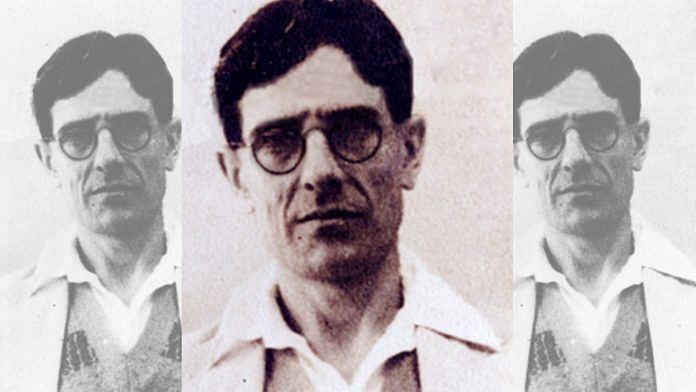New Delhi: Historian Ramachandra Guha sparked a controversy when he tweeted a quote from late British Communist and writer Philip Spratt, saying: “Gujarat, though economically advanced, is culturally a backward province… Bengal in contrast is economically backward but culturally advanced.”
"Gujarat, though economically advanced, is culturally a backward province… . Bengal in contrast is economically backward but culturally advanced".
Philip Spratt, writing in 1939.
— Ramachandra Guha (@Ram_Guha) June 11, 2020
Guha’s tweet drew retorts from Finance Minister Nirmala Sitharaman, Gujarat Chief Minister Vijay Rupani as well as Congress leader Ahmed Patel.
In 1939, when Philip Spratt, from Britain, belonging to the Communist International wrote, (who @Ram_Guha quotes) this was what was happening in Gujarat: Jamnagar…Maharaja Jam Saheb Digvijaysinhji Jadeja…saved 1000 Polish children #Culture https://t.co/5XsY2cL1WZ
— Nirmala Sitharaman (@nsitharaman) June 11, 2020
The economy is very much in safe hands; worry not, Mr. Guha. Taking cognisance of thoughts in current national discourse+responsibly doing my job aren’t mutually exclusive. Either way, an interest in history is a plus. Surely an intellectual such as yourself should know that ??. https://t.co/speBC2bggv
— Nirmala Sitharaman (@nsitharaman) June 11, 2020
Earlier it was the British who tried to divide and rule. Now it is a group of elites who want to divide Indians.
Indians won’t fall for such tricks.
Gujarat is great, Bengal is great…India is united.
Our cultural foundations are strong, our economic aspirations are high. https://t.co/9mCuqCt7d1
— Vijay Rupani (@vijayrupanibjp) June 11, 2020
This is an ill informed statement
From Kutch to Vapi & from Shyamlaji to Dwarka,Gujarat’s culture is built on striking diversity but united through indomitable entrepreneurial spirit
Every culture has it’s unique greatness,backwardness is our failure to understand this fact https://t.co/IKCLOnf85I
— Ahmed Patel (@ahmedpatel) June 11, 2020
But the historian retorted by thanking the “Troll Army” for making Spratt better known.
I have been trying without success for thirty years to make the writer Philip Spratt better known; thank you to the Troll Army for accomplishing this in a day.
— Ramachandra Guha (@Ram_Guha) June 11, 2020
ThePrint takes a look at the life and work of Spratt, and his association with India.
Also read: Does Ram Guha blame Modi voters like Rahul’s? A historian’s job is to assess, not admonish
Who was Philip Spratt?
Philip Spratt was born on 26 September 1902 in southern London to a school teacher and a housewife. Spratt grew up with nonconformist leanings, even though he was raised a Baptist and his father joined the Church of England.
He won a scholarship to attend Downing College at the University of Cambridge. Spratt’s tryst with Communism began at Cambridge, where he joined the University Labour Club — a debate forum that acted as a springboard to his eventual membership with the Communist Party of Great Britain (CPGB).
Two years after graduating, the CPGB sent Spratt to India in 1926, to report on the foundation of the Communist Party of India, which was in the early stages of its establishment. Spratt’s mission became forming the Workers and Peasants Party, and to capture trade unions across the country.
Also read: Ram Guha is wrong. Gandhi went from a racist young man to a racist middle-aged man
Controversies in India
Spratt mobilised thousands of workers and Communists in undivided India, travelling through Bombay, Delhi, Kanpur, and Lahore. In 1927, he was charged with sedition for writing a pamphlet titled ‘India and China’ on the instructions of the leadership at the CPGB.
B.R. Ambedkar, who was then a practising lawyer and would go on to draft the Constitution of India, took on the case and won, arguing that no disaffection had been shown to the Government of India.
But Spratt is more remembered for his involvement in the notorious Meerut Conspiracy Case — where about 30 CPI members, Congress members and others were arrested for organising a series of worker strikes in 1929. This was considered an offence under Section 121 A of the Indian Penal Code — an attempt at depriving the King of his sovereignty over British India.
The indictment claimed that the prisoners were linked to the Russian organisation Communist International, whose aim was the “creation of armed revolution, to overthrow all the existing forms of government throughout the world and to replace them by Soviet Republics subordinate to, and controlled by the central Soviet administration in Moscow”.
Several of those arrested, however, were not Communists at all. The case is believed to have revealed the British government’s fear of striking workers and the growth of Communism in India.
Spratt was originally sentenced to 12 years in prison, but his sentence was mitigated to two years and he was released in 1934.
Move to liberalism
Spratt began his move away from Communism after he was released, and adopted the ideas of a free-market liberal. Spratt wrote a number of books on India — from ‘Communism in India’ to his thoughts on Mahatma Gandhi.
In 1970, he was roped in to edit Swarajya, a newspaper run by C. Rajagopalachari and affiliated to the liberal Swatantra Party. Spratt died 15 months later, on 8 March 1971, in Madras (now Chennai).




This is a deliberate controversy created by Shri Guha to get his quota of 15 minutes of fame. This is his technique to keep himself in the limelight, supported by an intellectually clueless media.
Ramachandra Guha is a historian of dubious competence. He is bad tempered historian and lacks the equanimity required of a historian. Anyway, what was the provocation for calling Gujarat backward. I visisted Gujarat for the first time a few months. I didn’t notice any backwardness culturally. They have great music and dance tradition.
Backwardness means no left party is there
Period